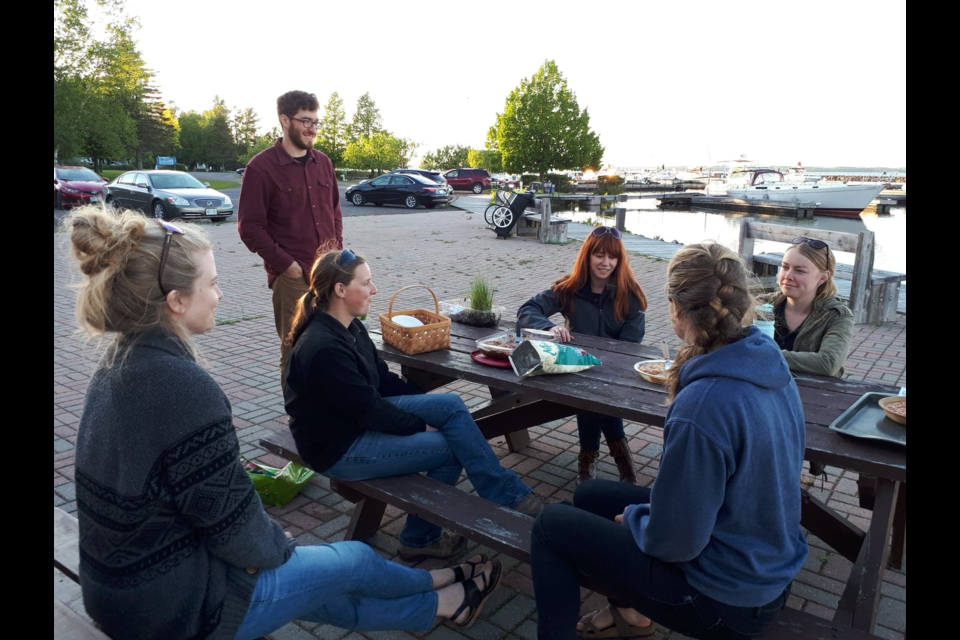Hollie Lefebvre believes what we put on our plates can shape our planet - for better or for worse.
“Where we’re at [with climate change], it’s really important to start sourcing things a little closer to home,” she says. “For me, knowing where the food comes from, and how its grown, and that it hasn’t been shipped across the world - those are important things as we look start to look globally at how we’re affecting our planet by the way that we eat."
The St. Joseph Island resident is part of a growing organization that hopes to make local, sustainable food easier to get--and less expensive - for people in the region.
The North Channel Food Co-op launched this April with a mission to source, share and secure a sustainable food network - and they’re making it happen. Since the launch, the small group of volunteers has grown to include a few dozen members who want to support local sustainable food production - and reap the benefits of doing so.
Hannah-Lee Lawrence is the owner of a vegan catering company, Black Cat Kitchen, which sells products out of Hilton Beach Farmers’ Market. She was looking to access ingredients from local, sustainable sources, and after talking to Mary McCrae (now President of North Channel Food Co-op) she realized that forming a group to order in bulk form would make that possible.
“You have to be a buyer’s club in order to access some of these companies,” she explains.
With the co-op, anyone in the area can get a membership for $20 a year.
“This gives access to a sustainable food network that will source healthy, high-quality, organic, responsibly produced goods that are as local as possible,” explains Lefebvre. “They will benefit from bulk rates, reduced rates, and lower shipping costs. This also provides the opportunity to reduce personal waste through buying in bulk.”
So far, the group is focused on dry goods, but has plans to expand to include fresh local produce. They source food from various companies (Ontario Natural Food Company, Arva Flour Mill, Camino, St. Joseph Island Roasters Coffee, and Mountain Path Organics), and have it shipped to a depot space at Hilton Beach Waterfront Centre where people can pick up their orders.
While buying sustainably produced food isn’t economically or geographically accessible for many, the group hopes to bridge that gap through bulk purchasing, working together and expanding their reach. Becoming part of the co-op provides members with buying power that could potentially have an impact on what is grown and produced in the region - and they get to join a community that supports one another in making more environmentally-conscious food choices.
“We hope that as we continue to place orders that members will spread the word and others will join,” notes Hollie. “People who wish to be more involved in volunteering with the coop can attend meetings, volunteer at work-bees, and help out on delivery days with the sorting and distribution of goods.”
A survey conducted by the group at the Sustain Algoma Expo last month revealed that reducing waste is also a prime concern for many area residents.
“With all of the plastic packaging, people are starting to think more about how they can reduce waste, and it’s hard when you’re shopping in a grocery store,” says Lawrence.
“If you can share in buying a large quantity of something - and you have the support of other people doing it at the same time - then it makes that possible. We have a Bulk Barn, but not everything there comes locally. We try to source as close to the Algoma region as possible,” she adds.
Lawrence notes that a lot of the co-op members are homesteaders who are interested in growing their own food, sharing tools and working collaboratively. Ultimately, they want to set up a retail space where they can sell the food, so people can access it without having to place large orders in advance.
“People are excited about the idea,” says Lawrence. “It’s very encouraging to meet other people who share these concerns and see how this could make it easier for them.”
“This is an exciting opportunity to bring awareness to our community around food-sourcing and rethinking our choices,” adds Lefebvre.
Her hope is that they can grow a supportive community that gathers for food education workshops, speaker series and potlucks.
“It’s a great opportunity for us to teach people the benefits and bring some awareness to the environmental issues around food.”
For more information on how to get involved, visit here.
